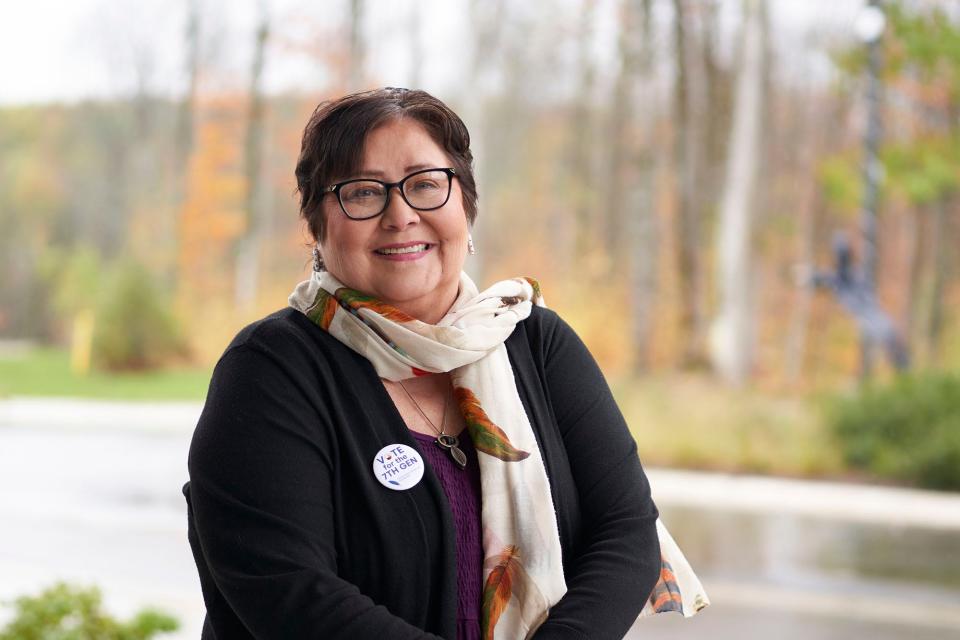'Indians aren't supposed to vote.' Wisconsin's gerrymandered maps reflect bias. | Opinion
I grew up on the Menominee Reservation in Wisconsin, surrounded by sprawling forests and pristine rivers that served as my natural playground. During clear summer nights, my siblings and I sat under the stars and breathed in the cool, refreshing air. On winter days, we skated across frozen ponds and sped down snowy hills on our makeshift sleds, built from hoods of broken-down cars.
Over the years, my father taught me the value of conservation and uniting with other tribes to preserve our sacred lands. I soon learned that the best way to protect Mother Earth, and to continue my father’s legacy as a revered environmental activist, was to fight for my people’s right to vote. As the Urban Native Vote Organizer for Wisconsin Native Vote, I work diligently with our tribes to get our people to the polls and to vote for the issues that matter to us. That, however, can only be accomplished if all our voices are heard.
The Wisconsin Supreme Court is currently considering a challenge to our existing legislative maps, which have been subject to extreme, partisan gerrymandering. They do not serve Native communities, nor do they serve Wisconsin voters at large. This case is a long-awaited opportunity to push back against politicians trying to lock in their own power by drawing maps to protect themselves and their interests. This is a moment for us to put power back in the hands of our people so we can fairly determine who represents us. We are eagerly awaiting a decision.
Tribal communities deliberately divided across districts
Although my people have been on this land for thousands of years, we continue to fight for fair and equal access to the ballot. We have faced significant barriers to voter access, from misinformation to restrictive voter identification laws, and most recently, gerrymandering. Our current legislative maps are among the most skewed in the country, and have specifically divided Tribal communities across districts, depriving our people of fair representation.
Through my organizing work, I have met Native people across Wisconsin who, after years of persistent discrimination, do not believe their voice matters. I have also experienced those barriers to voting firsthand when I moved to a Milwaukee suburb. When I arrived at my polling location to vote, a poll worker asked me where I was born. I responded, “the Menominee Reservation,” and she told me that Indians aren’t supposed to vote.

Despite moments like these, our people are more engaged in the democratic process and excited to vote than ever before. During this year’s spring election, we increased voter turnout on the Menominee Reservation by 75 percent compared to 2019, and the Red Cliff Band of Lake Superior Chippewa increased turnout by an astounding 130 percent. Relatives have sent me photos wearing their “I Voted Today” stickers on Election Day, and asked me to post it on our organization's website.
Wisconsin Supreme Court hearing legislative map case
Even with improved voter access, progress has stalled on the issues that matter to us most. And one of the greatest barriers is our current, unfair legislative maps. This case before the Wisconsin Supreme Court is a rare chance to attain fair maps through a nonpartisan, judicial process. We just want fair access and representation. No voter wins when legislative maps are manipulated to the benefit of one party, regardless of which party.
More commentary on Wisconsin election map case:
Wisconsin Supreme Court hearing offers hope for restoring fair election maps
I helped elect 3 Republicans to Wisconsin Supreme Court. I can't support impeachment.
Republicans want to impeach the will of the people by threatening Justice Protasiewicz
Our indigenous voices matter. The work to empower our community and to encourage our community to show up at the polls starts here: with knowing that we can attain fair maps in Wisconsin.
Anne Egan-Waukau is the Urban Native Vote Organizer for Wisconsin Native Vote and a member of the Menominee Indian Tribe of Wisconsin. As the Urban Native Vote Organizer, she fosters relationships with Indigenous relatives and organizations in Milwaukee, Madison, and the Ho-Chunk Nation, and works to ensure that Native people’s voices are heard at the ballot.
This article originally appeared on Milwaukee Journal Sentinel: Native American voters denied fair representation by GOP drawn maps

